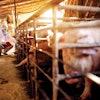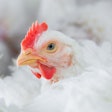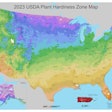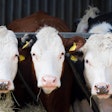
New review summarizes the events of the pandemic and what we might learn from them
Think back to the early days of the COVID-19 pandemic and you might remember shuttered restaurants, empty grocery store shelves, expensive meat and concerns about essential workers being able to keep our food supply chain operating. Even now, nearly two years later, high prices and supply chain bottlenecks are still occurring in many, if not most, sectors.
A new review, which resulted from the July 2021 Symposium of the American Registry of Professional Animal Scientists and appears in the journal Applied Animal Science, summarizes the pandemic-driven events that affected the food supply chain – particularly animal protein. The article, which I recommend reading, asks: “What did we learn from this event that might help us to reduce the vulnerability of our food production, processing and distribution systems to the disruptive effects of futures shocks?”
It calls COVID-19 “a textbook example of a black swan event: an extreme outlier that is hard to anticipate and, therefore, to manage.”
While the pandemic has been a great challenge, could it also be a great opportunity? A chance to identify weak spots along the supply chain and strengthen them? Is this the time to implement more automation to food production? How can food production systems prepare for the next great disruption now? These are not easy questions to answer.
“The pandemic has generated great interest in not only shortening food supply chains but also in greatly reducing the scale of operation of the chain’s components,” the article said. “Although this might offer advantages in terms of resilience to extreme events like the coronavirus pandemic, it would do this at the expense of efficiency of operation, resulting in higher costs throughout the system — for both consumers and producers.”
The article also points out that, as we now know, the various pieces of the food supply chain are intertwined and, if we alter how one part works, it will affect others.
“The unprecedented steps taken to address this challenge will themselves have important implications that merit thoughtful consideration,” the article said.
Many aspects of our lives may never go back to how they were in “The Before Times,” but maybe that’s not a bad thing. There are countless lessons to be learned from what we’ve experienced throughout the pandemic, and many of them could results in positive change, including in the agricultural supply chain.
If your company has made positive changes as a result of the pandemic, tell us about it in the comments below.

















